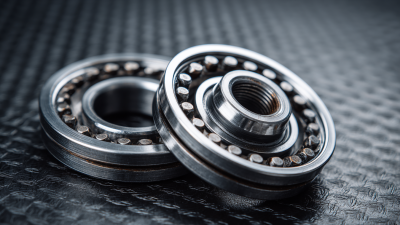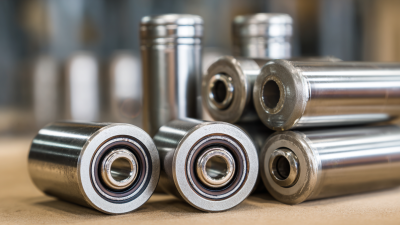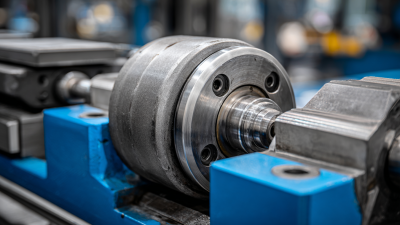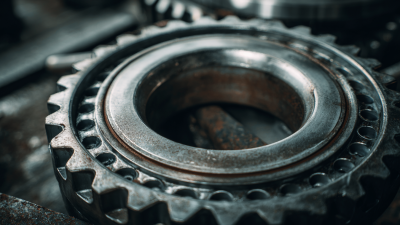Why Miniature Needle Bearings Are Essential for Precision Engineering
Table of Contents
- The Role of Miniature Needle Bearings in Precision Engineering
- Key Benefits of Using Miniature Needle Bearings in Machinery
- Types of Applications Benefiting from Miniature Needle Bearings
- Comparison of Miniature Needle Bearings with Other Bearing Types
- Maintenance and Performance Factors for Miniature Needle Bearings
- Future Trends in Miniature Needle Bearing Technology and Usage
- Unveiling the Advantages of HCSZ High Performance Low Noise Roller Needle Bearings: A Comprehensive Guide to Different Models
- FAQS
- Conclusion
- Related Posts
You know, in the world of precision engineering, Miniature Needle Bearings are kinda underrated but actually pretty essential. These tiny components might seem small, but they play a huge role in cutting down friction and boosting overall performance, whether it’s in cars, farming equipment, or other machinery. Shandong Hangshuo Bearing Co., Ltd., started back in 2015, and we’ve really made a name for ourselves in the biz. We focus on R&D, manufacturing, and selling all kinds of bearings — from automotive to mining, engineering, textile, you name it. We’re all about designing these bearings with innovation in mind and ensuring top-notch quality. Our goal? To deliver solutions that meet the industry’s tough standards for precision and dependability. That way, our partners can really count on us to help their projects run smoothly and efficiently.

The Role of Miniature Needle Bearings in Precision Engineering
Miniature needle bearings might be tiny, but they play a HUGE role when it comes to precision engineering. These small guys are essential for giving machinery the support and reliability it needs—especially in high-performance situations. Even though they’re small and tough, they do a lot of heavy lifting, like reducing friction and helping machines handle slight misalignments. That means everything runs smoother and at higher speeds. Plus, their compact size makes them perfect for tight spots—think robotics, aerospace, and medical devices where every tiny detail counts.
Lately, you’ve probably noticed more demand for these tiny bearings. That’s mostly because tech keeps advancing, and everyone’s looking for more efficient, durable equipment. When industries evolve, they need parts that can keep up—not just perform well, but last longer too. These miniature bearings don’t just boost how well machines work—they also help them stay in good shape longer, meaning less frequent repairs or replacements. Honestly, their unique design and resilience make them a must-have component in the future of precision engineering. No doubt about it, they’re here to stay.
Key Benefits of Using Miniature Needle Bearings in Machinery
Miniature needle bearings might sound a bit niche, but honestly, they’re pretty essential when it comes to precision engineering. They bring some pretty cool benefits that really boost how well machinery runs—making everything smoother, faster, and more efficient. One thing I find pretty neat is their ability to handle radial loads even in tight spaces, all while spinning at high speeds with minimal friction. According to a report from ISO, these tiny bearings can cut down friction losses by up to 30% compared to the old-school ball bearings, which can seriously make a difference in how efficiently a system works.

And, on top of that, their lightweight and compact design are huge pluses—especially for stuff like aerospace or medical devices where space and weight matter a lot. There's this study in the Journal of Mechanical Engineering that points out shrinking down bearing size can slash the overall weight of a machine by around 20 to 25%. That’s a game-changer for applications where every ounce counts. Plus, because they can handle quite a bit of load, manufacturers don’t have to go with bigger, heavier parts—saving size and weight without losing strength.
A quick tip if you’re thinking about choosing miniature needle bearings: pay attention to what kind of loads they’ll need to handle and the environment they’ll be working in. It’s a good idea to pick ones with proper sealing or shielding to keep out dirt and debris—this little step can stretch their lifespan a lot. And don’t forget, regular maintenance checks are key—they help catch wear early and keep everything running smoothly for ages.
Types of Applications Benefiting from Miniature Needle Bearings
Miniature needle bearings are really important in a bunch of precision engineering applications. Thanks to their ability to handle high radial loads while keeping friction low, they’re quite the star, especially in fields like automotive, aerospace, and medical devices. I came across a recent report by Research and Markets that says the global needle bearing market is expected to hit about $1.2 billion by 2025. That’s a clear sign that more industries are looking for efficient, reliable parts to keep their machinery running smoothly.
For example, in the automotive world, tiny needle bearings are pretty much essential for engine parts and transmissions. They help everything run more smoothly and even boost fuel efficiency—something manufacturers are definitely aiming for these days with all the strict environmental standards. The same goes for heavy machinery in mining or textile industries, where loads can be tough and reliability is a must. Companies like Shandong Hangshuo Bearing Co., Ltd. really focus on making high-quality miniature needle bearings tailored for these tough jobs. It’s all about innovation and providing top-notch solutions in engineering, you know?

Comparison of Miniature Needle Bearings with Other Bearing Types
Miniature needle bearings are really catching on these days, especially when we talk about their benefits in precision engineering. They've got this clever design that allows them to handle pretty heavy loads without taking up too much space—perfect if you're dealing with tight spots. In fact, recent research shows that needle bearings can handle up to 20% more load compared to similar-sized ball bearings, mainly because of their longer roller shape. This not only cuts down on friction but also helps mechanical parts last longer.
On top of that, they’re pretty awesome in high-speed setups. They tend to run cooler and waste less energy, which is a big plus for things like precision instruments or car parts. When you compare them to other options like bushings or standard rollers, needle bearings generally give you better precision and quicker response, which is super important in systems that need really fine control. You can especially see this in fields like robotics and aerospace, where even a tiny bit of extra accuracy can make a big difference.
Comparison of Miniature Needle Bearings with Other Bearing Types
Maintenance and Performance Factors for Miniature Needle Bearings
Miniature needle bearings may be tiny, but they actually play a huge role in precision engineering—especially when space is tight and performance really needs to be top-notch. Taking care of them isn’t just about keeping things running; it’s about making sure they last, too. Regular checks are a good idea—spotting signs of wear or any dirt that got in there early on can save a lot of headaches down the line. And let’s not forget the importance of lubrication. Using the right kind and just enough lubricant can make a big difference—reducing friction and preventing these little guys from failing prematurely.
When it comes to performance, factors like how much load they can handle, how fast they can go, and their temperature limits are super important. Engineers need to think about these when they’re choosing the right bearings. Proper alignment and correct installation are also key—they help avoid stress points that could cause early wear and tear. If we pay attention to both how we maintain these bearings and their performance specs, we can really unlock their full potential. That means machinery runs more smoothly, more reliably, and ultimately, more efficiently—that’s what it’s all about.
Future Trends in Miniature Needle Bearing Technology and Usage
The way miniature needle bearing tech is evolving is pretty exciting—it’s really poised to shake up precision engineering across so many industries. As manufacturers keep pushing for smaller, more efficient solutions, the need for new materials and smarter manufacturing methods has never been more important. Researchers are diving into advanced composites and special lubricants to boost durability and cut down on friction, which can make a huge difference in the performance of tiny, delicate applications. Oh, and there’s also a push to throw in some tech magic—like sensors embedded right in the bearings—to keep tabs on how they’re doing in real time. That way, we can make sure they’re running smoothly and last longer.
Looking ahead, it seems like sustainability is going to be a big part of the game. More and more, manufacturers are leaning toward eco-friendly materials and greener processes that use less waste and energy—pretty cool, right? This shift not only lines up with global efforts to be more environmentally conscious but also appeals to consumers who want products that are kinder to the planet. Plus, as components in things like robots and aerospace gear get tinier, there’s a growing need for even smaller, efficient needle bearings that can deliver top-notch performance without sacrificing reliability. It’s an exciting time to be in this space!
Why Miniature Needle Bearings Are Essential for Precision Engineering
| Dimension (mm) | Load Capacity (N) | Speed Rating (rpm) | Material | Application |
|---|---|---|---|---|
| 3 x 6 x 2 | 10 | 200,000 | Stainless Steel | Robotics |
| 4 x 8 x 3 | 15 | 180,000 | Chrome Steel | Precision Gearboxes |
| 5 x 9 x 3.5 | 20 | 150,000 | High Carbon Steel | Aerospace Components |
| 6 x 12 x 4 | 25 | 120,000 | Ceramic | Medical Devices |
| 7 x 14 x 5 | 30 | 100,000 | Plastic Composite | Consumer Electronics |
Unveiling the Advantages of HCSZ High Performance Low Noise Roller Needle Bearings: A Comprehensive Guide to Different Models
Needle bearings are an essential component in various engineering applications due to their unique design and high load-carrying capacity. The HCSZ High Performance Low Noise Roller Needle Bearings stand out in this category, designed specifically to enhance efficiency while minimizing operational noise. Their construction incorporates cylindrical rollers that are longer and thinner compared to traditional bearings, allowing for a smaller cross-section without compromising strength.
One of the remarkable advantages of the HCSZ models is their ability to support heavy loads in confined spaces, making them ideal for applications where space and weight are critical factors. These bearings facilitate smooth rotational movement and reduce friction due to their innovative design, which effectively distributes the load across the rollers. This results in improved durability and extended service life, making them a preferred choice in a variety of industries, including automotive, aerospace, and machinery.
In addition to their robust performance, HCSZ High Performance Low Noise Roller Needle Bearings are engineered to operate with reduced noise levels, which can significantly enhance the overall user experience. The low noise operation is particularly beneficial in applications where sound levels are a concern, such as in household appliances or medical equipment. With their combination of strength, compact size, and quiet performance, these needle bearings provide a versatile solution for modern engineering challenges.
FAQS
: Miniature needle bearings improve the performance and efficiency of machinery by handling radial loads in confined spaces, maintaining high speed and low friction, and reducing friction loss by up to 30% compared to traditional ball bearings.
The lightweight and compact design of miniature needle bearings can lead to a 20-25% decrease in overall machine weight, which is essential for weight-sensitive applications, particularly in aerospace and medical devices.
Miniature needle bearings are widely used in the automotive, aerospace, and medical equipment industries, driven by their ability to handle high radial loads while minimizing friction.
In the automotive sector, miniature needle bearings are critical for engine components and transmission systems, enabling smoother operation and enhancing fuel efficiency.
Miniature needle bearings can achieve up to 20% higher load capacities than traditional ball bearings of similar sizes, reduce friction, and enhance the lifespan of mechanical systems due to their elongated roller shape.
When selecting miniature needle bearings, it is important to consider specific load requirements, environmental conditions, and to ensure they are appropriately sealed or shielded to prevent contamination.
Regular maintenance checks can help identify wear early and extend the life of the bearings and machinery, ensuring optimal performance over time.
Miniature needle bearings operate at significantly lower temperatures and with reduced energy loss in high-speed applications, making them preferred for precision instruments and automotive components.
Miniature needle bearings generally provide improved precision and responsiveness compared to bushings and standard roller bearings, which is crucial for systems requiring meticulous control, such as robotics and aerospace engineering.
Conclusion
Miniature Needle Bearings may sound pretty technical, but honestly, they’re a pretty big deal when it comes to precision engineering. These tiny bearings pack a punch—they’re small but can handle quite a lot of weight, which makes them perfect in spaces where every millimeter counts. You’ll often find them in industries like automotive, mining, or even complex machinery, where’s it’s all about getting things to run smoothly and reliably.
When you compare them to other types of bearings, what really sets Miniature Needle Bearings apart is their clever design. They reduce friction and can spin faster, which is crucial for a bunch of modern tech applications. And with tech continuously advancing, these bearings keep getting better—more efficient, adaptable, and reliable. At Shandong Hangshuo Bearing Co., Ltd., we’re pretty passionate about pushing the boundaries of bearing technology, so we can offer top-notch Miniature Needle Bearings that keep up with the changing market demands.
Related Posts
-

7 Tips to Optimize Your Miniature Flanged Ball Bearings for Maximum Performance
-

How to Choose the Right Miniature Flanged Bearings for Your Application
-

How to Choose the Right Bearing Block With Shaft for Your Project
-

Maximizing Efficiency: The Unique Advantages of Cam Follower Needle Roller Bearings in Modern Manufacturing
-

How to Choose the Best Cushion Bearing for Your Industrial Needs
-

Ultimate Guide to Understanding 22206 Roller Bearing Specifications and Applications
Blog Tags:

